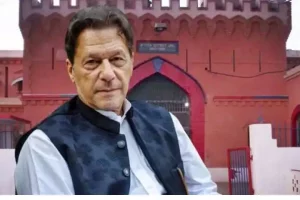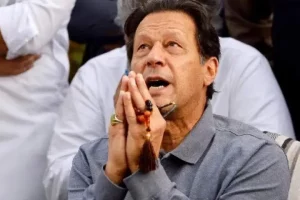
Azam Khan (Left) former Principal Secretary of ex-Prime Minister Imran Khan (Right) in happier times
In the subtle pendulum shifts, but which do not change the big picture of the Pakistani army’s intent to sideline Imran Khan from political contention, it appears that the ex-Prime Minister will after all be tried in military courts.
The military’s unwavering firmness to punish Khan follows the violent May 09 attacks on the symbols of the army’s power including the General Headquarter in Rawalpindi and Jinnah House in Lahore, the Lahore corps commander’s residence. The military has blamed Khan and his loyalists from the Pakistan Tehreek-e-Insaf (PTI) party which he leads for the mayhem.
Two key factors explain why Khan could go to jail following the May 09 riots. First, the Chief Justice of Pakistan (CJP), Umar Ata Bandial, who has so far walled Khan’s arrest has shown signs that he might not be entirely opposed to his military trial.
On Wednesday, a six-member bench of the apex court, headed by CJP Bandial heard petitions challenging the trial of civilians accused of the May 09 attacks, in the military courts under the Army Act 1952. His observations to the petitions are interesting.
During proceedings, the CJP asked the attorney general Mansoor Awan if the suspects of May 9 will be allowed the right to appeal in civilian court against their convictions, presumably by the military courts. “You will have to satisfy the court that after the trial of suspects in the May 9 incidents, the accused persons will have fair opportunity of right of appeal against their conviction and will be ensured fair trial,” he told the AG as quoted by Pakistani daily News International.
The via media suggested by the CJP Bandial who retires in September, and which the army is likely to endorse, opens the door for Khan being, at least initially, tried in a military court.
Despite the military’s inclination for an early military trial, it appears that the key parties of the ruling coalition, the Pakistan Muslim League-Nawaz (PMLN) and the Pakistan People’s Party (PPP) are reluctant to back such action against Khan, in a bid to project themselves as abiders of rule of law, pursuing a non-vindictive path towards the ex-Prime Minister.
Former President Asif Ali Zardari and Foreign Minister and Chairman Pakistan Peoples Party, Bilawal Bhutto Zardari called on Prime Minister Shehbaz Sharif in Islamabad on 18th of July, 2023. pic.twitter.com/fLtcSOo7yQ
— KaiseR Baloch (PSF) (@kaiserpsf) July 19, 2023
So, with the incumbent government deciding to hang its boots on August 8, paving the way for elections, it is likely that the operation dismantle Imran will gather steam only after a caretaker government assumes power ahead of elections. Consequently, the military is keen that Mohsin Beg, a close friend of Army Chief Asim Munir is appointed as the caretaker Prime Minister, and conditions are created to delay elections, allowing time to dock Imran.
Second, there is more trouble piling up against Khan, which could pave his path to imprisonment. For instance, his citadel overseas, especially in the United States seems to have been breached. Observers are surprised that Khan’s supporters were not allowed to use platform of Association of Physicians of Pakistani Descent of North America (APPNA) convention held in Dallas recently. Instead, they had to hold a pro-PTI gathering at a nearby hotel.
Community Report:
APPNA 46th Annual Convention 2023. The Association of Physicians of Pakistani Descent of North America, 5 days convention was held in Dallas TX.
Report:#saminaiftekharahmed
#appnaconventiondallastx #gaylordtexanresort #alizafar #SajjadAli #alisethi #RagaBoyz pic.twitter.com/8QIx7Wgqap— Ladies Social Network (@LadiesSocialNW) July 12, 2023
This comes at a time when the Americans are furious at Khan for leaking a confidential cable, called Cypher at a public event, which the ex-PM used to build a case of US interference in engineering a no-confidence motion, that removed him from power in April 2022.
Earlier this week, Khan got further bogged down in what is called the Cypher gate scandal when his former Principal secretary Azam Khan revealed details of how the ex-Prime Minister used the secret cable from the United States for his personal political gains.
On Wednesday Azam in his confessional statement recorded before a magistrate under CrPC 164, asserted that the “cypher drama” was a premeditated conspiracy hatched by the ex-Prime Minister.
Ahead of his ouster in a no-confidence motion, Khan had alleged on March 27, 2022, during a rally of PTI workers that Washington had orchestrated the movement to remove him from office. To establish his point Khan had brandished the cypher that he had received in March.
During the rally, less than a month before he was ousted, Khan did not reveal the contents of the letter nor mention the name of the country from where it was sent. But a few days later, he asserted that the cable had originated in the United States, and the US Assistant Secretary of State for South and Central Asia Affairs Donald Lu had sought his removal. The cable followed a meeting between former Pak ambassador to the US Asad Majeed’s and Lu.
Two developments today goes against Imran Khan and will turn tables.
1- USA defends Donald Lu against Imran Khan and PTI’d disinformation.
2- Azam Khan records his statement to the “magistrate” under 164 against Imran Khan that Cipher was a conspiracy. pic.twitter.com/ci3lkocdKz
— Shama Junejo (@ShamaJunejo) July 19, 2023
In his confession, Azam said when he provided Imran with the cypher that as principal secretary he had received, the former Prime Minister was “euphoric” and called it a “US blunder”.
The ex-prime minister then said, according to Azam, that the cable could be used for “creating a narrative against establishment and opposition,” and divert public attention towards “foreign involvement” in the opposition’s no-confidence motion.
By mishandling the cypher issue, Khan could be charged under Section 5 of the Official Secrets Act 1923. If proved in the court of law, he can be imprisoned from two to 14 years, and would not be necessarily immune to a death penalty.
Also Read: Why Pakistan’s post-Imran transition may take longer than expected















